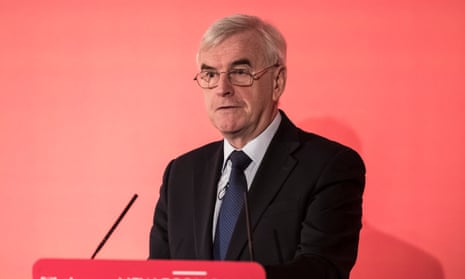Labour is considering a tax on land values as a way of boosting local government budgets, shadow chancellor John McDonnell has said.
In a sign of the party’s confidence about growing public interest in a fresh approach to managing the economy, McDonnell said cuts to council spending were so severe that it might now be possible “to have a rational debate”.
At the last election the Tories called Labour’s proposal for a tax on commercial land values a “garden tax” that could force home owners to sell up. The Greens and the Liberal Democrats are also interested in the idea.
A land tax, where a percentage of the value of the land is levied annually, is popular with some economists, who say it is a logical approach to taxing individual wealth. But many politicians across the political spectrum are alarmed at the thought of introducing a new tax. A new tax on wealth that creates losers as well as winners would inevitably be a hard sell.
But McDonnell told the audience at the event organised by the Resolution Foundation, where he set out Labour’s plans to boost household incomes, that the crisis in the funding of local services may have opened a window of opportunity.
“I think we are at a stage where the decline in terms of funding to local government and the consequential effect on local services – many of them are in crisis – means, I think, that people are now willing to consider more radical solutions than they have in the past.”
Councils are hamstrung by government rules and cannot raise council tax significantly without a local referendum, which would be costly to run and would have an uncertain result. But the tax – introduced nearly 30 years ago to replace the unpopular poll tax – has not been uprated since then. It leaves many councils struggling, with too small a tax base to meet all their obligations.
Other councils are on the brink of catastrophe. Northamptonshire county council announced earlier this month that it could only afford to meet its statutory obligations. On Thursday the accountants KPMG, which audits the council’s budget, said it did not balance and was therefore illegal.
The local government association has said that by 2020 many councils would struggle to provide some public services, partly because of botched central government reforms. By 2020, central government funding will have been cut by more than 50% since 2010.
Council tax is regressive because it is levied on a notional value that has no relation to household income or to the market value of the property. However, unless it is regularly updated, a land value tax would share some of those weaknesses. But it would be directly related to the wealth of the homeowner and it would capture the rapid growth in house values that have been a financial boost to those who own property.
One council, Westminster, one of the richest in the country, is now proposing that wealthy residents pay a voluntary additional contribution, ringfenced to help offer improved services to rough sleepers and young people.
There is increasing support in policymaking circles for a land-value tax. Tony Blair’s thinktank, the Tony Blair Institute for Global Change, backed the idea in a policy paper published at the end of last year.
